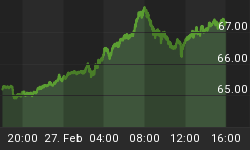Last week I read an article in The Fiscal Times titled 'U.S. Markets Buoyed by Encouraging Jobs Report' - reading time 4 minutes. The article appears to, in part, attribute the increase in the U.S. equity markets indexes on Thursday to the release of last week's U.S. Labor Department report. This report said that 395,000 people filed for initial unemployment claims in the previous week, 10,000 fewer than economists had expected. I can only shake my head in disbelief that someone thought that small, inconsequential, and 'subject to adjustment' number of 10,000 (or 2.4%) initial unemployment insurance claims below economists' estimates - which themselves can be argued to be nothing more than 'best guesses' - would cause the U.S. financial markets to materially change direction. To me this is akin to saying that a baseball player hit a home run because a peanut vendor fell and rolled with his peanuts down 20 stadium steps, when a bystander who watched him fall predicted the peanut vendor would roll down 21 steps!
Then last Friday, another peanut vendor at the next baseball game in the multi-game series fell down a different set of stadium steps. On that day, another article in The Fiscal Times reported 'US Stocks Rise After Strong Retail Sales Report' - reading time 3 minutes. This article suggested that "A strong report on retail sales in July sent U.S. stock index futures higher after a week of record-setting gains and losses". I find this type of reporting lacking, even if it is right which I seriously doubt. My reasons are:
- First - and dealing with the specific comment made in the article - retail sales numbers are irrelevant without an analysis of corresponding gross margins. If retailers succeeded in generating more sales in absolute dollars by dropping prices and sacrificing gross margins to sell more units, that ought to be a 'bad' thing from an equities markets perspective.
- One of the problems I suspect underlies a good deal of today's reporting in very complex economic times, is that I suspect comparatively few writers have the underlying technical and business knowledge and experience to make the links. The reporter who wrote the referenced article above may well be one of those writers who can make the links, but just didn't bother to write them down;
- Second - dealing with generalities, the old saying 'one swallow does not a summer make' strikes me as being seriously 'in play' here. One monthly report, which might turn out to subsequently be re-stated, be it a report on retail sales, jobs gains or losses, unemployment claims, trade surpluses or deficits, and so on, can't possibly be something that the financial markets ought to react to in significant way. If the financial markets do react in a significant way to single news items that can be easily taken out of context or reversed the next month, then I say that anyone who participates in those markets - certainly as a trader - doesn't 'have to go to Las Vegas to go to Las Vegas'.
Intuitively, I am becoming ever more convinced that the financial markets are increasingly trading markets, not investment markets where 'investment' means a long-term hold. I am also not sure that necessarily is a bad thing, given what I see as current high levels of uncertainty in the prospective world economic condition.
As for the two peanut vendors, they are home recovering from sever concussions while the 'band plays on' at the game.















